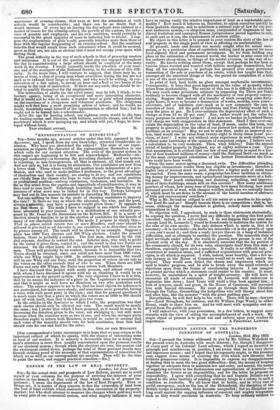"REPRESENTATION OF MINORI TIE S."
SIR—Some months ago several articles under this title appeared in the Spectator, and, I speak from my own knowledge, attracted considerable at- tention. Why have you abandoned the subject? The state of our repre- sentation as regards the character of the representatives themselves is one which calls for our earnest attention. The evils of the present system in this respect are beginning to be felt and acknowledged. Mediocrity—ste- reotyped mediocrity—is becoming the prevailing character ; and our system is rejecting, as non-homogeneous, all that is eminent, all that stands out. And not only so, but it is losing its attractions. Our candidates are now from a lower class. Those whom wealth and position made independent of a pro- fession, and who used to make politics a profession, to the great advantage of themselves and their country., are ceasing to do so ; and our candidates are chiefly from the classes who hope to raise themselves in social position or professional position—railway contractors, tradesmen, and barristers. So far as this arises from the caprice and ingratitude of constituencies, it may in time tend to cure itself. Edinburgh humbling itself before Macaulay is an instance of what more may be looked for in this way. Perhaps Liverpool may find out in like manner its mistake in discarding Mr. Cardwell. But can nothing be done in the mode of choosing candidates to improve the race ? Is there no way in which the educated, the wise, and the good, always a nsinority, may have a greater weight given them ? It appears to me that there M. The mode I have to suggest is one which has already, been advocated in your journal. It is a modification of one actually pro- posed by Mr. Praed in the discussions on the Reform Bill. It is a mode of election already familiar to us in the election of candidates for the benefit of many of our charitable institutions. The mode I propose is simply this— That in places which return two or more Members, each voter should be allowed to give both or all his votes to one candidate, or to distribute them as he pleases among all. The result will be shown by an example. Suppose a place has 1000 'Tory electors and 900 Whig electors. Under the present system, there is probably a contest. The best man, deterred by the risk and expense, declines to contest the seat. Inferior men, who wish to profit by the status it gives them, contest it ; and the reault is that two Tories are returned. On the other hand, let each elector give both votes for the same man. There will probably be no contest, because it is impossible that two Tories should be returned, since one could not have more than 1000 votes, while one Whig might have 1800. In ordinary circumstances, the result will be one Whig and one Tory, until the proportion of voters on one side to the voters on the other exceeds that of two to one. When there are 1000 Tories and only 499 Whigs, the Tories may return both Members.
I have discussed this project with many persons, and almost every one with whom I have discussed it agrees with me in thinking it would be an improvement on the present system. The only objection I have to it is this, that by its means the influence of a place in the Legislature is neutralized, and that it might as well have no Members as two who neutralize each other. The answer appears to me to be, that for local objects its influence is not neutralized, but made more steady, and sometimes more powerful, having a voice with each great party in the state ; and that for general questions it is much more fair that a place in which the voters are as 1000 to 900 should pair off with itself, than that it should give two votes. In the articles in the Spectator to which I refer, the proposition was that each elector should only be allowed one vote. The result would be nearly the same ; but I prefer that which I have proposed, as it would be seen to be increasing the donation given to the voter, not abridging it ; but still more because when the numbers were as two to one, and when the stronger party therefore ought to return both Members, it would be easier to arrange that each voter of the majority should vote for both candidates, than that half should vote for one and half for the other.
ONE OF THE MINORITY.
[Our correspondent's letter encourages us to hope that we may return to the important subject of which he speaks, with the chance of interesting some at least of our readers. It is scarcely a favourable time for so doing when men's attention is more than usually concentrated upon the personal results of our electoral system ; though when the elections are over, the passion and the excitement cooled down, perhaps the total of those personal results may furnish striking proof of the necessity of that representation of minorities for which we as well as our correspondent are anxious. Then will be the time to point the moral, and suggest practical remedies.—En.]


























 Previous page
Previous page